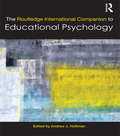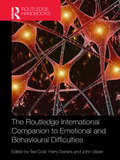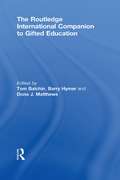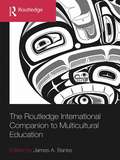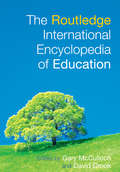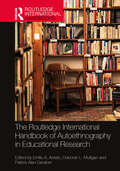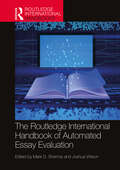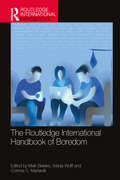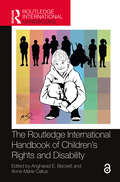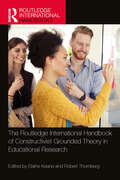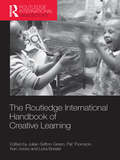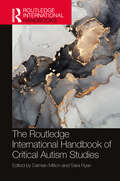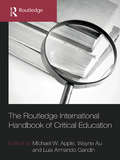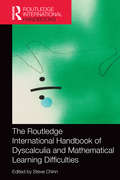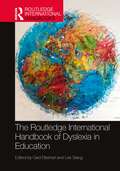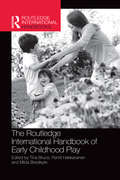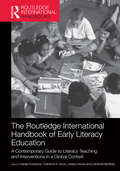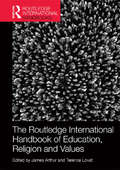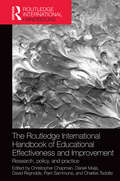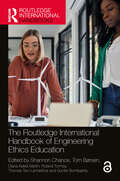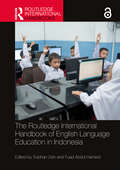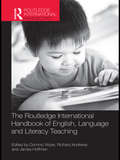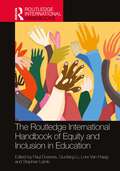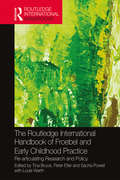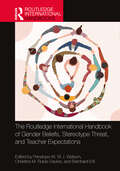- Table View
- List View
The Routledge International Companion to Educational Psychology
by Andrew J. HollimanThe Routledge International Companion to Educational Psychology brings together expert practitioners, researchers, and teachers from five continents to produce a unique and global guide to the core topics in the field. Each chapter includes coverage of the key thinkers, topic areas, events, and ideas that have shaped the field, but also takes the reader beyond typical textbook material and into engagement with current issues, cutting-edge research and future directions in the field of educational psychology from an international perspective. With over 30 chapters, the volume is divided into four themed sections: ‘An introduction to educational psychology’, ‘How children learn and develop’, ‘Issues concerning the assessment of children’ and ‘Identifying and meeting the needs of children with learning difficulties’. Covering the key issues and fundamental strands of educational psychology The Routledge International Companion to Educational Psychology aims to provide the reader with knowledge of: educational psychology (history, child rights, and practice); factors which influence children’s learning and development; issues to do with assessment (a key aspect of educational psychology); special educational needs (identification and how to meet their needs); the key thinkers, events, and ideas that have shaped the field; the core topics across educational psychology in an accessible manner; cutting edge research including recent research evidence and theory; future directions in the field of educational psychology; educational psychology from an international perspective. The book is conceived for both student and researcher use, and considers the implications for educational psychology practice in all sections. It will be highly beneficial for both students and lecturers on Education Studies and Psychology undergraduate courses, as well as combined undergraduate degrees .
The Routledge International Companion to Emotional and Behavioural Difficulties
by Harry Daniels Ted Cole John VisserResponding to disruptive or troubled pupils with emotional and behavioural difficulties (EBD) remains a highly topical issue. The challenges these children present relate to wider issues of continuing political concern: the perceived declining discipline in schools; school and social exclusion; the limits to inclusion for children with special needs; increasing mental health difficulties in children; youth crime and parenting skills. It’s little wonder that the 'EBD' (often known as ‘BESD’ or ‘SEBD’) category is one of the most common forms of SEN around the world. This topical and exhaustively-researched Companion examines the difficulties of defining EBD, and the dangers of allocating this imprecise label to children. Bringing together the work of contributors from fifteen countries and across four continents, this book features the research of leading experts in the global field of EBD, who discuss and debate educators’ key concerns by: looking at the overlaps between EBD, ADHD and mental health difficulties; outlining the types of appropriate schooling for children with EBD; urging readers to look beyond pupils’ challenging behaviour in order to understand and respond to the social, biological and psychological causation; considering the key areas of assessment, whole-school and targeted approaches that help pupils with EBD in mainstream and in special settings; outlining helpful work with families, the crucial contribution of effective multi-agency working and the importance of supporting and developing teachers who work with challenging pupils. Containing contrasting views on controversial topics, this Companion’s approachable style makes it an essential reference book for academics, policy makers, practitioners, educators and students who are working towards a higher degree in education.
The Routledge International Companion to Gifted Education
by Barry Hymer Tom Balchin Dona J. MatthewsThe Routledge International Companion to Gifted Education is a ground-breaking collection of fully-referenced chapters written by many of the most highly-respected authorities on the subject from around the world. These fifty contributors include distinguished scholars who have produced many of the most significant advances to the field over the past few decades, like Joseph Renzulli and Robert Sternberg, alongside authorities who ask questions about the very concepts and terminology embodied in the field – scholars such as Carol Dweck and Guy Claxton. This multi-faceted volume: highlights strategies to support giftedness in children, providing ideas that work and weeding out those that don’t; is written in jargon-free language in an easy-to use themed format; is the most authoritative collection of future-focused views, ideas and reflections, practices and evaluations yet produced; includes chapters dealing with the major controversies and concerns in the field today, from the problems of identification to changing understandings of giftedness and creativity. The international aspect of the Companion, and its juxtaposition of points of view – whereby chapters are deliberately positioned and accompanied by editorial commentary to highlight the contrasts with each other – ensures that different views are addressed, allowing the reader to absorb and reflect upon the many perspectives on each issue. The Companion is a guide to the new ideas and controversies that are informing gifted education discussion and policy-making around the world. It is a first class resource to students and researchers alike.
The Routledge International Companion to Multicultural Education (Routledge International Handbooks of Education)
by James A. BanksThis volume is the first authoritative reference work to provide a truly comprehensive international description and analysis of multicultural education around the world. It is organized around key concepts and uses case studies from various nations in different parts of the world to exemplify and illustrate the concepts. Case studies are from many nations, including the United States, the United Kingdom, Canada, Australia, France, Germany, Spain, Norway, Bulgaria, Russia, South Africa, Japan, China, India, New Zealand, Malaysia, Singapore, Indonesia, Brazil, and Mexico. Two chapters focus on regions – Latin America and the French-speaking nations in Africa. The book is divided into ten sections, covering theory and research pertaining to curriculum reform, immigration and citizenship, language, religion, and the education of ethnic and cultural minority groups among other topics. With fortynewly commissioned pieces written by a prestigious group of internationally renowned scholars, The Routledge International Companion to Multicultural Education provides the definitive statement on the state of multicultural education and on its possibilities for the future.
The Routledge International Encyclopedia of Education
by David Crook Gary McCullochThe Routledge International Encyclopedia of Education is a unique and major resource for the field of education. It is a comprehensive, single-volume work, arranged alphabetically and comprising around 600 entries. The entries range from definitions of key educational concepts and terms to biographies of key educators and specially written substantial essays on major educational topics. The volume includes authoritative and critical commentary on historical and contemporary themes; examinations of continuities, changes and emerging issues; and discussions of the educational traditions and features of major countries and continents. The following special features are also included: Unrivalled coverage of education in a single volume Entries by leading international educational researchers Contributors drawn from all over the globe, including Australia, Brazil, Canada, China, Finland, India, Israel, Japan, New Zealand, South Africa, the United Kingdom and the United States A distinguished international advisory board Fully cross-referenced and indexed Suggestions for further reading Offering insight into the world of education in an interesting, informed and sometimes provocative way, The Routledge International Encyclopedia of Education is an invaluable work of reference for educators, students, researchers and policy makers in education and related fields internationally.
The Routledge International Handbook of Autoethnography in Educational Research (Routledge International Handbooks)
by Patrick Alan Danaher Deborah L. Mulligan Emilio A. AntelizThe Routledge International Handbook of Autoethnography in Educational Research presents diverse and rigorous contemporary research at the intersection between autoethnography and educational research. The handbook investigates the bidirectional connection between autoethnography and educational research in relation to four themes: enhancing teaching and teacher education with autoethnography; enlarging doctoral study and supervision with autoethnography; conducting identity work and relationship-building via autoethnography; and promoting social justice through autoethnography. In addition to the synthesising introduction and conclusion chapters, the 27 main chapters in the handbook cover current research from Africa, Aotearoa New Zealand, Australia, Bangladesh, Canada, Spain, the United Kingdom, the United States and Venezuela. The chapters present novel applications of several key concepts and research methods, including activism, arts-based research, critical reflection, decolonising feminism, doctoral study and supervision, hybrid identities, Indigenous research, migrant education, racism, researcher self-efficacy, teacher identity, visual autoethnography and writing as voice. This book will be of use to all researchers, and doctoral and Masters students, using qualitative and autoethnographic methods in Education and related fields.
The Routledge International Handbook of Automated Essay Evaluation (Routledge International Handbooks)
by Joshua Wilson Mark D. ShermisThe Routledge International Handbook of Automated Essay Evaluation (AEE) is a definitive guide at the intersection of automation, artificial intelligence, and education. This volume encapsulates the ongoing advancement of AEE, reflecting its application in both large-scale and classroom-based assessments to support teaching and learning endeavors.It presents a comprehensive overview of AEE's current applications, including its extension into reading, speech, mathematics, and writing research; modern automated feedback systems; critical issues in automated evaluation such as psychometrics, fairness, bias, transparency, and validity; and the technological innovations that fuel current and future developments in this field. As AEE approaches a tipping point of global implementation, this Handbook stands as an essential resource, advocating for the conscientious adoption of AEE tools to enhance educational practices ethically. The Handbook will benefit readers by equipping them with the knowledge to thoughtfully integrate AEE, thereby enriching educational assessment, teaching, and learning worldwide.Aimed at researchers, educators, AEE developers, and policymakers, the Handbook is poised not only to chart the current landscape but also to stimulate scholarly discourse, define and inform best practices, and propel and guide future innovations.
The Routledge International Handbook of Boredom (Routledge International Handbooks)
by Maik Bieleke Wanja Wolff Corinna S. MartarelliThis comprehensive text is a unique handbook dedicated to research on boredom. The book brings together leading contributors from across three continents and numerous fields to provide an interdisciplinary exploration of boredom, its theoretical underpinnings, its experiential properties, and the applied contexts in which it occurs.Boredom is often viewed as a mental state with little utility, though recent research suggests that it can be a powerful motivator of human behavior that shapes our actions in many ways. The book examines boredom from a range of perspectives and is comprised of three parts. Part I delves into the theoretical approaches to boredom, presenting methods for its measurement, explaining when and why boredom occurs, and scrutinizing the impact it has on our behavior. Part II focuses on the psychological and neural properties of boredom and its associations with a multitude of mental and interpersonal processes, such as self-control, mind-wandering, flow, and aggression. Part III presents boredom in practical contexts like school and work, and sheds light on its role for health-related behaviors, psychosocial well-being, and aesthetic experiences. The book concludes by summarizing the state of boredom research, identifying promising areas for future research, and providing directions for how research on boredom can be advanced. As the authoritative book on boredom, this handbook is an essential resource for students and researchers of psychology, sociology, education, sport science, and computer science.
The Routledge International Handbook of Children's Rights and Disability (Routledge International Handbooks)
by Angharad E. Beckett Anne-Marie CallusThis handbook provides authoritative and cutting-edge analyses of various aspects of the rights and lives of disabled children around the world. Taking the UN Convention on the Rights of Persons with Disabilities (CRPD) and the UN Convention of the Rights of the Child (CRC) as conceptual frameworks, this work appraises the current state of affairs concerning the rights of disabled children across different stages of childhood, different life domains, and different socio-cultural contexts. The book is divided into four sections: Legislation and Policy Children’s Voice The Life Course in Childhood Life Domains in Childhood Comprised of 37 newly commissioned chapters featuring analyses of UN documents and case studies from Australia, Brazil, Ethiopia, Hong Kong, Italy, the Netherlands, Norway, Papua New Guinea, Serbia, South Africa, Spain, Sweden, the United Kingdom, the United States, and Vanuatu, its multidisciplinary approach reflects the complexities of the lives of disabled children and the multifarious nature of the strategies needed to ensure their rights are upheld. It will be of interest to researchers and students working in disability studies, education, allied health, law, philosophy, play studies, social policy, and the sociology of childhood. It will also be a valuable resource for professionals/practitioners, allowing them to consider future directions for ensuring that disabled children’s rights are realised and their well-being and dignity are assured.
The Routledge International Handbook of Constructivist Grounded Theory in Educational Research (Routledge International Handbooks)
by Elaine Keane Robert ThornbergThe Routledge International Handbook of Constructivist Grounded Theory in Educational Research provides a comprehensive overview of the state of the art in Constructivist Grounded Theory (CGT) methodology, including core grounded theory tenets and processes as well as constructivist ‘adaptations’. It features CGT research from across the education sector, including studies based in primary schooling, post-primary (second-level) schooling, and higher education.Across 5 parts and 20 chapters, the book makes explicit how CGT techniques and processes were implemented in the field, the way(s) in which challenges were navigated, and how educational researchers aligned their research processes to constructivist principles. It offers exemplars of good practice by educational researchers from Australia, Ireland, Italy, Norway, Sweden, Switzerland, the UK, and the USA. The Handbook synthesises learning from the experiences of CGT researchers in education to establish a framework of guidance for early career and more experienced researchers. Additionally, it directly interrogates and considers how to address challenges in the implementation of high-quality CGT and looks to the future of the methodology in educational research.This Handbook provides guidance and education-specific examples to doctoral students and researchers who wish to use or are using CGT in educational research. It will also be of significant interest to qualitative researchers in other disciplines like sociology, psychology, and nursing.
The Routledge International Handbook of Creative Learning (Routledge International Handbooks of Education)
by Ken Jones Julian Sefton-Green Pat Thomson Liora BreslerThe concept of creative learning extends far beyond Arts-based learning or the development of individual creativity. It covers a range of processes and initiatives throughout the world that share common values, systems and practices aimed at making learning more creative. This applies at individual, classroom, or whole school level, always with the aim of fully realising young people’s potential. Until now there has been no single text bringing together the significant literature that explores the dimensions of creative learning, despite the work of artists in schools and the development of a cadre of creative teaching and learning specialists. Containing a mixture of newly commissioned chapters, reprints and updated versions of previous publications, this book brings together major theorists and current research. Comprising of key readings in creative education, it will stand as a uniquely authoritative text that will appeal to those involved in initial and continuing teacher education, as well as research academics and policy specialists. Sections include: a general introduction to the field of creative learning arts learning traditions, with sub sections on discrete art forms such as drama and visual art accounts of practice from artist-teacher partnerships whole school change and reforms curriculum change assessment evaluative case studies of impact and effect global studies of policy change around creative learning.
The Routledge International Handbook of Critical Autism Studies (Routledge International Handbooks)
by Damian Milton and Sara RyanThis handbook provides an authoritative and up-to-date overview of Critical Autism Studies and explores the different kinds of knowledges and their articulations, similarities, and differences across cultural contexts and key tensions within this subdiscipline. Critical Autism Studies is a developing area occupying an exciting space of development within learning and teaching in higher education. It has a strong trajectory within the autistic academic and advocate community in resistance and response to the persistence of autism retaining an identity as a genetic disorder of the brain. Divided into four parts • Conceptualising autism • Autistic identity • Community and culture • Practice and comprising 24 newly commissioned chapters written by academics and activists, it explores areas of education, Critical Race Theory, domestic violence and abuse, sexuality, biopolitics, health, and social care practices. It will be of interest to all scholars and students of disability studies, sociology, anthropology, cultural studies, education, health, social care, and political science.
The Routledge International Handbook of Critical Education (Routledge International Handbooks of Education)
by Michael W. Apple Wayne Au Luis Armando GandinThe Routledge International Handbook of Critical Education is the first authoritative reference work to provide an international analysis of the relationship between power, knowledge, education, and schooling. Rather than focusing solely on questions of how we teach efficiently and effectively, contributors to this volume push further to also think critically about education's relationship to economic, political, and cultural power. The various sections of this book integrate into their analyses the conceptual, political, pedagogic, and practical histories, tensions, and resources that have established critical education as one of the most vital and growing movements within the field of education, including topics such as: social movements and pedagogic work critical research methods for critical education the politics of practice and the recreation of theory the freirian legacy. With a comprehensive introduction by Michael W. Apple, Wayne Au, and Luis Armando Gandin, along with thirty-five newly-commissioned pieces by some of the most prestigious education scholars in the world, this Handbook provides the definitive statement on the state of critical education and on its possibilities for the future.
The Routledge International Handbook of Dyscalculia and Mathematical Learning Difficulties (Routledge International Handbooks of Education)
by Steve ChinnMathematics plays an important part in every person’s life, so why isn’t everyone good at it? The Routledge International Handbook of Dyscalculia and Mathematical Learning Difficulties brings together commissioned pieces by a range of hand-picked influential, international authors from a variety of disciplines, all of whom share a high public profile. More than fifty experts write about mathematics learning difficulties and disabilities from a range of perspectives and answer questions such as: What are mathematics learning difficulties and disabilities? What are the key skills and concepts for learning mathematics? How will IT help, now and in the future? What is the role of language and vocabulary? How should we teach mathematics? By posing notoriously difficult questions such as these and studying the answers The Routledge International Handbook of Dyscalculia and Mathematical Learning Difficulties is the authoritative volume and is essential reading for academics in the field of mathematics. It is an incredibly important contribution to the study of dyscalculia and mathematical difficulties in children and young adults.
The Routledge International Handbook of Dyslexia in Education (Routledge International Handbooks of Education)
by Gad ElbeheriThe Routledge International Handbook of Dyslexia in Education showcases the various examples, expertise, and successful initiatives attempted to include students with dyslexia around the globe. It highlights progress and identifies gaps for growth globally to stand united against dyslexia as a literacy problem and a specific learning disability challenge. Taking a truly global view, each chapter from world-leading experts highlights issues related to the definition of dyslexia and how it is recognised locally, its implications on relevant legislations and educational policy and how teacher training programs on dyslexia are delivered at both pre-service and in-service levels. Contributors to this handbook also discuss and compare the services and tools available to identify individuals with dyslexia, such as nationally standardized tests and tools for dyslexia assessment. Students, researchers, teachers and other educational professionals who require highly relevant, research-informed guidance on dyslexia and its awareness, identification, training, outreach, and intervention around the globe will find this handbook an essential and timely resource. Readers will also be able to identify shared experiences and good lessons from around the world, as well as learn about better strategies to guide their journey in their own local community.
The Routledge International Handbook of Early Childhood Play (Routledge International Handbooks of Education)
by Tina Bruce Milda Bredikyte Pentti HakkarainenHistorical changes in play are taking place in childhood all over the world, with the digitalisation of children’s lives. Researchers are worried about the disappearance of advanced forms of play and the prioritization of time spent with loving adults, supporting play with babies and toddlers. At the same time, our understanding about the crucial importance of individual development is becoming clearer. The Routledge International Handbook of Early Childhood Play explores these issues and more. It proposes the importance of adult participation in play, as adult guidance brings the possibility of moral, cultural and symbolic elements to children’s play, and enhances the educational opportunities in adult-child joint play. The book also examines the aesthetic dimension of play and its role in the development of imagination and creativity. With contributors from many parts of the world, this unique handbook brings together the latest research and highlights practice which focuses on play. This is an essential and engaging read for all students, academics, teachers and practitioners with an interest in play.
The Routledge International Handbook of Early Literacy Education: A Contemporary Guide to Literacy Teaching and Interventions in a Global Context (Routledge International Handbooks of Education)
by Catherine E. Snow Vibeke Grøver Catherine Mcbride Natalia KucirkovaThe Routledge International Handbook of Early Literacy Education offers a pioneering overview of early literacy provision in different parts of the world and brings together interdisciplinary research evidence on effective literacy teaching to inform current and future practice and policy of early literacy. From the problem of identification of literacy difficulties in a particular learning context to supporting the provision of early literacy through digital media, the handbook deals with the major concerns and newest areas of interest in literacy research. With an international and future vision, it provides an accessible guide to the main debates and future trends in the global field of early literacy, and informs academics, policy-makers, practitioners, educators and students about innovative early literacy research methods and instruction. The three sections and 30 ground-breaking chapters reflect a conceptual framework of questions asked by scholars and educators interested in looking beyond traditional definitions of literacy. Part I provides contemporary insights collected by internationally renowned scholars on what literacy is, and what it can offer to young children in the twenty-first century. Part II is a collection of detailed portraits of 14 countries, regions or language communities, and focuses on early literacy provision, practice and policy from across the world. Part III outlines key interventions and research-endorsed practices designed to support home–school connections and children’s reading and writing skills, as well as vocabulary, phonological awareness and narrative abilities, with examples drawn from various home, school and community environments. All chapters promote discussion, critical analysis and questions for reflection and are written in jargon-free language in an easy-to use themed format. This handbook is an indispensable reference guide for practising teachers and student teachers, especially those undertaking postgraduate qualifications, as well as early literacy researchers, policy-makers and school-based literacy leaders.
The Routledge International Handbook of Education, Religion and Values (Routledge International Handbooks of Education)
by James Arthur Terence LovatThe academic fields of religion and values have become the focus of renewed interest in contemporary thinking about human activity and its motivations. The Routledge International Handbook of Education, Religion and Values explores and expands upon a range of international research related to this revival. The book provides an authoritative overview of global issues in religion and values, surveying the state of the academic area in contributions covering a wide range of topics. It includes emerging, controversial, and cutting-edge contributions, as well as investigations into more established areas. International authorities Arthur and Lovat have brought together experts from across the world to examine the complexity of the field of study. The handbook is organised around four key topics, which focus on both the importance of religion and values as broad fields of human enquiry, as well as in their application to education, inter-agency work and cross-cultural endeavours: -The Conceptual World of Religion and Values -Religion and Values in Education -Religion and Values in Inter-agency Work -Religion and Values in Cross-cultural Work. This comprehensive reference work combines theoretical and empirical research of international significance, and will be valuable reading for students, researchers and academics in the field of education.
The Routledge International Handbook of Educational Effectiveness and Improvement: Research, policy, and practice (Routledge International Handbooks of Education)
by David Reynolds Daniel Muijs Charles Teddlie Christopher Chapman Pam SammonsThe International Handbook of Educational Effectiveness and Improvement draws together leading academics and researchers in the field to reflect on the history, traditions and the most recent developments in this dynamic and influential field. This handbook provides a comprehensive overview of: the foundations of the field the evolution of educational effectiveness theory and methodology the links with other research disciplines the links between policy and practice. In conclusion, the handbook sets out a new agenda for future educational effectiveness research. This handbook is an essential resource for those interested in the effectiveness of educational systems, organisations and classrooms. It offers academics, researchers, students and policy-makers new insights into the latest thinking and evidence about educational effectiveness.
The Routledge International Handbook of Engineering Ethics Education (Routledge International Handbooks of Education)
by Shannon Chance and Tom BørsenResponding to the need for a timely and authoritative volume dedicated to this burgeoning and expansive area of research, this handbook will provide readers with a map of themes, topics, and arguments in the field of engineering ethics education (EEE).Featuring critical discussion, research collaboration, and a team of international contributors of globally recognized standing, this volume comprises six key sections which elaborate on the foundations of EEE, teaching methods, accreditation and assessment, and interdisciplinary contributions. Over 100 researchers of EEE from around the globe consider the field from the perspectives of teaching, research, philosophy, and administration. The chapters cover fast-moving topics central to our current understanding of the world such as the general data protection regulation (GDPR), artificial intelligence (AI), biotechnology, and ChatGPT; and they offer new insights into best practices research to equip program leaders and instructors delivering ethics content to students.This Open Access volume will be of interest to researchers, scholars, postgraduate students, and faculty involved with engineering education, engineering ethics, and philosophy of education. Curriculum designers, staff developers teaching pedagogical courses to faculty, and engineering professionals may also benefit from this volume.The Open Access version of this book, available at http://www.taylorfrancis.com, has been made available under a Creative Commons Attribution-Non Commercial-No Derivatives (CC-BY-NC-ND) 4.0 license.
The Routledge International Handbook of English Language Education in Indonesia
by Subhan Zein Fuad Abdul HamiedThis handbook is a landmark volume offering an unparalleled exploration of English language education in the world’s largest archipelagic nation. Home to over 17,000 islands and more than 600 ethnolinguistic groups, Indonesia has an extraordinary linguistic and cultural diversity making up a unique context for English language education. With the growing prominence of Indonesia’s superdiversity, this comprehensive resource on English language education in the country is timely.This handbook assembles cutting-edge research reviews from a diverse group of contributors, both Indonesian and international. It investigates key themes across six major areas: history and policy; curriculum and assessment; pedagogy; teacher education; English in the education system; and innovative approaches to the English language, teaching, and research. With perspectives ranging from historical and sociolinguistic to pedagogical and ideological, the chapters provide a multidimensional understanding of the complexities and opportunities shaping English language education in Indonesia.An essential resource for academics, policymakers, teachers, and students, this volume not only captures the dynamism of English education in Indonesia but also charts pathways for future scholarship, practice, and policymaking. It serves as a critical reference for anyone seeking to understand and contribute to the evolving landscape of English language education in the nation.
The Routledge International Handbook of English, Language and Literacy Teaching (Routledge International Handbooks of Education)
by Dominic WyseEdited by three authorities in the field, this Handbook presents contributions from experts across the world who report the cutting-edge of international research. It is ground-breaking in its holistic, evidence-informed account that aims to synthesize key messages for policy and practice in English, language and literacy teaching. A comprehensive collection, the Handbook focuses on the three key areas of reading, writing, and language, and issues that cut across them. The international emphasis of all the chapters is extended by a final section that looks directly at different countries and continents. The authors address many key issues including: why pupil motivation is so important the evidence for what works in teaching and learning the place of Information Technology in the twenty-first century the status of English and other languages globalisation and political control of education. This definitive guide concludes by discussing the need for better policy cycles that genuinely build on research evidence and teachers’ working knowledge in order to engage young people and transform their life chances. A powerful account that will be of interest to students, researchers and academics involved with education.
The Routledge International Handbook of Equity and Inclusion in Education (Routledge International Handbooks of Education)
by Guofang Li Stephen Lamb Paul Downes Lore Van PraagProviding a cornerstone to the global debate on equity and inclusion within education, this handbook explores equity issues pertaining to poverty and social class, race, ethnicity, sociocultural, sociolinguistic exclusion in education and recognises intersectionality and gender across these dimensions.This carefully curated collection of essays written by international experts promotes inclusive systems in education that explicitly recognise the voices of learners who may be at risk of marginalisation, exclusion or underachievement. Developing a multilayered innovative conceptual framework involving spatial, emotional-relational and dialogical 'turns' for education, it emphasises key system points for reform, including building strategic bridges between health and education for vulnerable groups and shifts in focus for initial teacher education and the wider curriculum.The handbook is organised into the following key parts: Theoretical Frameworks Funding Models and Structures for Equity and Inclusive Systems Exclusion and Discrimination Bridging Health and Education Agency and Empowerment Outreach and Engagement The Routledge International Handbook of Equity and Inclusion in Education will be of great value to academics operating in the areas of education, psychology, sociology, social policy, ethnography, cultural studies; researchers in university research centres and in policy institutes pertaining to education, poverty, social inclusion as well as international organisations involved with inclusion in education.
The Routledge International Handbook of Froebel and Early Childhood Practice: Re-articulating Research and Policy (Routledge International Handbooks of Education)
by Tina Bruce Sacha Powell Peter Elfer Louie WerthA major influence on the education of young children since the late nineteenth century, the philosophical and practical tenets of Frobelian early childhood education require urgent re-articulation in light of current debate and developments in research and policy. This seminal Handbook responds to this need, drawing together a unique and valuable body of literature, research and case studies to make explicit the specific features of Froebelian education and provide key impulses for future research and practice in this area. Chapters present the sometimes divergent perspectives of leading educationalists, and so offer a uniquely comprehensive overview of Froebelian approaches and their interaction with contemporary policies and insights. The Handbook explores five significant areas of scholarship and practice: Part I examines the original Froebelian principles and practices in early childhood education in different parts of the world. Part II presents case studies, development projects and practitioner publications exploring Froebelian approaches to early childhood education. Part III details research studies which document, debate and evaluate Froebelian approaches. Part IV considers how Froebelian approaches might be sustained and adapted for use in various cultural contexts across the world. Part V offers a re-articulation of research and policy. An essential resource for in-service and future practitioners, researchers and policy-makers involved in early childhood education, this key text will promote discussion, aid analysis and further the practical application of Frobelian principles.
The Routledge International Handbook of Gender Beliefs, Stereotype Threat, and Teacher Expectations (Routledge International Handbooks of Education)
by Christine M. Rubie-Davies Bernhard Ertl Penelope W. St J. WatsonThe Routledge International Handbook of Gender Beliefs, Stereotype Threat, and Teacher Expectations presents, for the first time, the work of leading researchers exploring the synergies and interrelationships between these fields, and provides a catalytic platform for advancing theory, practice, policy and research from an integrated perspective. An understanding of how gender beliefs, stereotype threat, and teacher expectations interrelate is vital to creating safe, equitable, and encouraging learning spaces. The collection summarises how gender beliefs, stereotype threat, and teacher expectations act in association to influence gendered student achievement, engagement, and self-beliefs, and suggests ways toward rectifying their negative effects. The chapters are organised into four sections: Gender Beliefs, Identity, Stereotypes, and Student Futures Stereotype Threat Teacher Expectations Synergies and Solutions By examining synergies and solutions shared between the three fields, this book creates more meaningful, consistent, and permanent approaches to achieving gender identity safety, gendered scholastic equity, well-being, and positive futures for students. This comprehensive publication brings together cutting-edge research at the intersection of gender beliefs, stereotype threat, and teacher expectations. It is an essential reference for researchers and postgraduate students in education and gender studies as well as educational, social, and developmental psychology.
